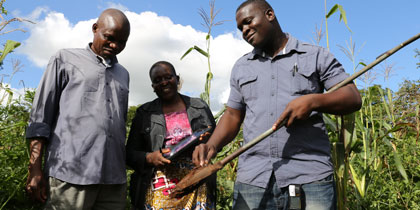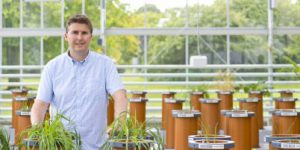
December 5, 2018, by Lindsay Brooke
World Soil Day – Nottingham puts soil science on world stage
It’s World Soil Day today, the annual awareness day run by the United Nations Food and Agriculture Organisation. The event aims to raise awareness of the importance of soil quality for human well-being, food security and ecosystems.
Here’s just a flavour of the soil science and facilities that support the University of Nottingham’s internationally recognised research in tackling world hunger in the face of climate change – from soil, to molecule to meal.
Next year Sacha Mooney, Professor of Soil Physics in the School of Biosciences,
will become President of the British Society of Soil Science. This is the first time a University of Nottingham academic has held the position.
X-Ray Vision – In 2014 the Hounsfield Facility opened for business. For the first time in 10,000 years of plant breeding, scientists could see a plant’s root architecture directly in the soil, as it is in the field, and use this information to select the most efficient varieties for farmers to grow. The facilities have broken new barriers in research into plants and how they grow.
They can even track worms as they move about in soil.
Soil and Plant Interactions – as our climate changes the pressure on both soil and water resources will intensify and the need for sustainable management will increase. These challenges are currently being addressed by this multi-faceted research programme.
Managing microbes – the key to solving the global nitrogen crisis. Experts from the UK and Brazil have joined forces to address the challenges and opportunities for agricultural nitrogen science in Florianopolis, Brazil.
Hidden hunger – helping to reduce ‘hidden hunger’ in Ethiopia and Malawi. A multidisciplinary team of researchers including those working in agriculture, nutrition, socio-economics, geography, and ethics has received more than £4.4m from the Bill & Melinda Gates Foundation to help alleviate micronutrient deficiencies.
This year Martin Broadley, Professor of Plant Nutrition won a prestigious Innovator of the Year award for international impact, in recognition of his world-leading research into solving hidden hunger. Together with Dr Louise Ander of the British Geological Survey (BGS), they were presented with the award by the Biotechnology and Biological Sciences Research Council (BBSRC) for their pioneering work on GeoNutrition and the spatial aspects of hidden hunger.
Researchers are visiting 2,000 farms in Malawi, collecting soil and crop samples to help fight a challenge to the health of millions across sub-Saharan Africa. This mapping will equip policy makers in Malawi’s health and agriculture ministries with unrivalled data to inform responses to hidden hunger.
Graduate Centre for International Agriculture (GCIA) – the University of Nottingham is working with Rothamsted Research to create a Graduate Centre for International Agriculture. Rothamsted is a world-leading, non-profit research centre focussing on strategic agricultural science to the benefit of farmers and society worldwide. The newly formed GCIA is part of the Future Food Beacon of Excellence launched by the University in June which will tackle global challenges in international agricultural development.
New Rothamsted International – University of Nottingham Fellowships – are part of a joint £5million investment to support early-career researcher opportunities in the field of international agricultural development. This collaboration focuses on vital, much needed agricultural research skills in low-and middle- income countries. The focus will be on developing skills that can be applied in the fellow’s home institution, who will also be encouraged to help design the fellowship programme activities.
No comments yet, fill out a comment to be the first


Leave a Reply